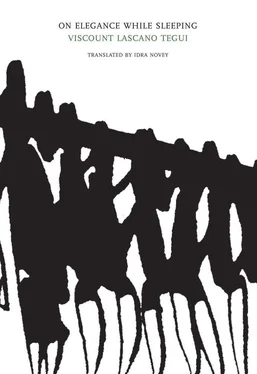My neighbor frequently picked up her hens and chastised them, ridiculously, waggling her index finger: “If anyone comes to steal you, you’d better get away! Don’t let yourself be taken away by who-knows-what sort of brute!”
Then she’d let them go, only to return later and repeat her instructions to them one by one.
It is believed that the birds understood.
Her hens were the most anxious chickens I’ve ever seen. The slightest sound would send them scurrying; they’d run, horrified, to take refuge under their owner’s skirts.
Perhaps this seems charming to you? But statistics show that there’s always an increase in instances of heart disease in populations living under a tyrannical regime. Those hens, under the pressure of their owner’s constant threats, all died young — suffocated by disproportionately small hearts, certainly worth less than the livers of geese from Périgueux…
JANUARY 14, 18—
The world,” the coachman told me, “is slowly committing suicide…” He paused to think of a way to illustrate his point, setting aside his whip, and then added: “For example, every single day the semen of our great geniuses — that most vital of fluids — leaks out through an opening that is directly connected to their spinal columns, and so they are gradually reduced to nothing — those same arrogant geniuses who, if they were allowed to develop fully, would, admittedly, prove quite a nuisance to humanity…but who are also our only means of moving forward! This is the trade-off we make in the modern age…perhaps solitary vice should be considered the social virtue par excellence ! Certainly if people made love on the streets, in front of everyone, health and hygiene levels in the city would be above reproach. Onanism, however, despite putting an end to so much human progress, has the advantage of culling our herd, and of uniting those of us who are left! It’s an elimination test.
“For ages it’s proven impossible to unite all the strata of mankind. Our geniuses were pretentious and individualist and un-apologetically so. Their destiny was to lead all other men to the slaughter and thus be left alone in their brilliance, solitary and lofty as the mountains. But see, masturbation has put an end to those demigods. They couldn’t survive the modern world without masturbation. In other words, they’ve become “civilized.” Women — in whom, you know, all the capital sins are combined: everywhere to be seen, nowadays, but now not quite so accessible as in the days of kings and tyrants — breezed gently through the eyes of our geniuses and lay down upon the soft cushions of their cerebellums…Yes, masturbation took over, making these geniuses descend to the common territory of all base mortals — tarnished now, despite their greatness! Now they look like gray stone military monuments: tall, and with a primitive, corrupt sort of authority about them — but entirely anti-aesthetic. They lie in wait for us at night, their stony bodies obstructing the paths of all things tender, soft, and beautiful — hoping to trip us up, petrified and perverse! That’s their revenge, you see, upon the rest of us! And that’s precisely what they’ve told me, when I’ve taken their confessions — when I managed at last to work their souls free from their calcified bodies, the same way you peel the hide off a slaughtered cow…brute force.”
JANUARY 16, 18—
At twenty, she was an artist’s girlfriend. She didn’t deserve the distinction. She lacked enthusiasm. She interrupted his work with the same misplaced solemnity that led her to sleep with him on a rainy day just to avoid getting her feet wet and then move to Bougival and open a flower shop. In Bougival, her shop was considered a useless luxury. As she sat waiting for customers, the hours passed and her daughter grew. The artist sent her eighty francs a month to show he still remembered her. She divided up the francs with myopic delight into four weekly sums. The old florist would go to the post office every Tuesday to cash her money order. Her daughter was in charge when she was out, and so planned Tuesday dates with one boy or another. That’s how we, the boys of the town, found out Anita had a rash on her back. She was saving up for her future by acquiring gifts from admirers who came to see her rash. One gift she liked in particular was an ornamental comb that cost fifteen francs. At last, Anita disappeared without saying good-bye. Her mother only noticed her absence on a Tuesday, when she realized there was no one to watch the store. She became timid and stopped going out. She made the mailman cash her money orders for her and bring by her twenty weekly francs directly to the shop. Without air and sunshine her plants all dried up.
Novelists overplay their hands when they put an end to their characters with some catastrophe — a terrible fire, a murder, what have you. They don’t trust in the asphyxiating monotony of everyday life. The florist’s was no more fascinating than a piece of dried seaweed. What she owned, where she lived, her days and nights: all were of the same homogenous consistency, bringing to mind the dull, lifeless backgrounds of the sepia landscapes commonly produced by professional photographers.
JANUARY 26, 18—
The children of degenerates step into life before other children. They start living centuries earlier. Health means nothing more than living in normal time. A broken watch ticks more often than one in perfect condition. It lives more. The children of the abnormal are mortgages owed by their parents. They’re born old. Born intelligent to the point of insanity. Sensitive to the point of silence. They’ve lived in their mothers’ bellies, their fathers’ blood, for years and years of an exhausting sensuality. They’re born with severe and well-worn faces. Their eyes are already jaded, as if they’ve seen too many Corot landscapes and gray was the only color in their cosmologies. Their hands are worn and they bite at their mothers’ breasts when suckling. They’re premature lovers. The wise children of the great languishing of our spinal fluids!
This was what made my neighbor’s daughter so strange, and destined her to die long before the other skinny girls in Bougival. At a year old, she could already speak with ease. She was given to hyperbole. Things didn’t interest her because they existed — only because of the sensation they produced in her. She never picked things up; just passed her hands over them.
Noise bothered her. She listened closely, frightened. She couldn’t help but translate noise, in her mind, into intense emotion (if only sailors could do the same when describing storms at sea in their three-hundred page naval manuals…). The first words she sounded out were adjectives. They remained her primary mode of communication for as long as she lived. She knew things by their qualities. She called water “cold,” she said “sweet” for milk, “hard” for bread — and it was the same with anything pleasant: an apple, her mother, a wooden horse, a silver bucket. For all the things that made her cry, she said “Boo.” “Boo” was the catch-all word for all the bad things that haunted the life of this tiny, sensitive girl destined to die on an autumn afternoon, because life couldn’t possibly give her what her genius demanded.
She died, incidentally, in my arms the other day, after I took her out onto the balcony and showed her the distant panorama of Paris. On seeing it, the girl, fifteen months old, turned to me and said, as if we were in agreement: “Boo?”
JANUARY 27, 18—
When night comes, crowds hit the old neighborhoods like herds of boars escaping the purest of women (Diana) — clerks twisted and gnawed by their desires till they resemble the old files from their offices, the sex maniacs, vampires, and still-ashamed pederasts, all looking for refuge in the slums and suburbs and peeping into the buildings there, unbuttoning their pants and pissing at random against the walls and trees.
Читать дальше












